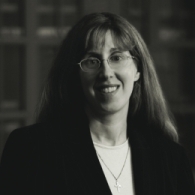Innovative Educators
From Fire Places to Law Cases
This profile of Professor Nancy Combs appeared in the fall 2008 edition of the W&M Alumni Magazine. The W&M Alumni Association recently honored Combs with an Alumni Fellowship Award, which is given each year to a select group of young faculty to recognize teaching excellence. Reprinted with permission. Photo by Mark Mitchell.
 Having clerked for prominent jurists such as Diarmuid O'Scannlain on the 9th Circuit Court of Appeals and Justice Anthony Kennedy on the U.S. Supreme Court, Nancy Combs' domestic law credentials are hardly in question. What sets her apart is her experience in international law -- and chimney sweeping.
Having clerked for prominent jurists such as Diarmuid O'Scannlain on the 9th Circuit Court of Appeals and Justice Anthony Kennedy on the U.S. Supreme Court, Nancy Combs' domestic law credentials are hardly in question. What sets her apart is her experience in international law -- and chimney sweeping.
Combs spent five years after high school running a chimney sweeping business, which she calls "a little unusual."
She later changed course and attended the University of Portland in Oregon before going on to earn a law degree at the University of California-Berkeley and a Ph.D. from Leiden University in the Netherlands. She took a position at the U.S.-Iran Claims Tribunal and spent nearly a decade in The Hague, which is known as the "international law capital of the world."
"I went for a year and I stayed for eight," she says. "I just kept renewing my contract."
When the time came to move to the world of academia, William and Mary seemed like just the right place. Here, Combs was able to complete her book, Guilty Pleas in International Law: Constructing a Restorative Justice Approach, in which she maintains that guilty pleas for international crimes, if obtained appropriately, have the potential to enhance accountability and advance reconciliation and truth-telling following mass atrocities.
"I really love international law because it allows me the opportunity to think through hard theoretical problems in my scholarship while still being engaged in the real world," she says. Part of that engagement is her teaching.
The nation's oldest law school, like its peer institutions, employs one of the world's oldest educational strategies: the Socratic method. Combs does not merely intend for her class to learn static facts, but to change the way they approach facts.
"The idea is not just to learn criminal law, i.e., 'what is the doctrine?' I could hand you an outline right now and you could learn it," she says. "The idea is to learn how to think like a lawyer."
Once her students pass through her first-year domestic criminal law class, they can elect to continue in their second year with international criminal law. Even though her later courses are not part of the standard law education, she still sees many of her first-year students come back for more -- whether they plan to pursue the topic or not.
"My upper level classes are not on the bar, and they have limited relevance to the typical domestic law practice," she says. "Students really have to be interested in the material and I'm delighted that so many are."
Combs is even more positive about those students who go beyond the Virginia bar exam and into the world of human rights and international law.
"I find it particularly rewarding that so many students are fired up to work in the field of human rights, since the problems are so grave and the need for enthusiastic commitment and creative solutions so pressing," she says. "William and Mary students have so much to give and it's great to see them bringing their talents to bear on some of the world's most trenchant difficulties."